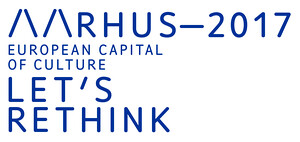A Shining City on a Hill
April 22–May 21, 2017
Jasmina Cibic’s extensive multi-media installation represents the culmination of her ambitious project for European Capital of Culture Aarhus 2017, presenting a new video commission and performance alongside recent work. The effect is to create a complex narrative around the practices of nation building and soft power that is simultaneously intricate and diffuse, critical and implicit.
The exhibition includes her most recent film, Nada Act II, alongside the first part of the eventual trilogy Nada and works Tear Down and Rebuild, The Nation Loves It, Fruits of Our Land, Double Game and The Pavilion. These works span five years of production, and taken together form part of a greater ongoing exploration. Cibic shot Nada: Act II in Arne Jacobsen’s Aarhus City Hall. She uses this suitably gesamt architectural structure as a stage par excellence; a cinematographic device within which she places a recreation of the performance of Béla Bartók’s pantomime ballet The Miraculous Mandarin at the 1958 Brussels EXPO. It was this work that the Yugoslav Republic chose to represent its new direction on Nations Day almost sixty years ago. Here is it repurposed, mis-imagined and overwritten with new purpose in collaboration with the choreographer Lea Anderson. Bartók’s original characters—the pimps, prostitute and exotic Mandarin—are here replaced with the archetypes of politicians, the ideal of Mother Nation, and that most easily abused of Modern practitioners: the architect.
Gathering together these symbols and iconographies, Cibic’s projects present a synthesis of gesture, stagecraft and re-enactment. Instantiated in films and installations, hers is also an ongoing performative practice, an “enacted” exercise in the dissection of statecraft. Her multilayered approach draws together primary sources and falsified narratives. This willful overwriting creates shifting meanings and highlights historical uncertainties and untruths, especially in the gendering of the past. Cibic plays a double-game, at once decoding mechanisms of power whilst building her own exemplary allegorical structures. Hers is a practice that addresses the ways in which visual language, art, architecture, and rhetoric are deployed and instrumentalised by political regimes, before investigating what happens to these fragments when the ideologies they endorse collapse.
“Jasmina Cibic’s immersive film installations often include durational performance, experimental theatre and varieties of delegated creations of artistic objects and spaces. We are very proud, that she has chosen the city hall of Aarhus as setting for her latest work,” says Rebecca Matthews, CEO at European Cultural Capital Aarhus 2017.
“Jasmina Cibic’s amazing films bring attention to modernism and its movements, and in particular concentrate our awareness on the roles architects and architecture play in the creation of nationalism and civic-ness. Her project is to make evident the turmoil of creation, the backdrop of censorship and the aspiration of iconic works that become synonymous with place and identity,” says Juliana Engberg, Programme Director, Aarhus 2017.
Aarhus 2017 represents an ideal context for Cibic’s double-game to play out. Whilst her references to the modernist movement and its relationship to various ideological structures appears historical, it also functions as a codex. Its legibility in hindsight allows for its transposition onto more ambiguous contemporary instances of the mobilization of culture for politico-economic ends. The European Capital of Culture program represents both a concerted attempt to bring a festival of culture to a city perhaps not previously recognized for it, whilst also an invitation to commercial development. What are we to make of art placed in such a service to the state, and what can we learn from the history’s more sinister accounts of this most awkward relationship? That is one among many questions Cibic’s work raises through its tireless and variegated archaeologies.
The exhibition opens April 22 at 2:30pm at “O” Space Aarhus, Denmark
Nada Act II is co-commissioned by European Capital of Culture Aarhus 2017, BALTIC Centre for Contemporary Art Gateshead and supported by Arts Council England, Northern Film School at Leeds Beckett University and Waddington Studios London.


